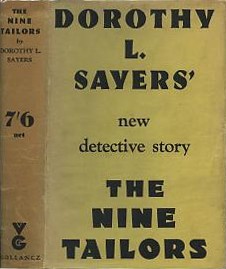
The Nine Tailors is a 1934 mystery novel by the British writer Dorothy L. Sayers, her ninth featuring Lord Peter Wimsey. The story is set in the Lincolnshire Fens, and revolves around a group of bell-ringers at the local parish church. The book has been described as Sayers' finest literary achievement, although not all critics were convinced by the mode of death, nor by the amount of technical campanology detail included.

Edmund Crispin was the pseudonym of Robert Bruce Montgomery, an English crime writer and composer known for his Gervase Fen novels and for his musical scores for the early films in the Carry On series.
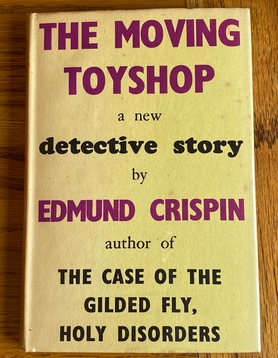
The Moving Toyshop (1946) is a work of detective fiction by Edmund Crispin, featuring his recurrent sleuth, Gervase Fen, an Oxford professor of English Language and Literature.
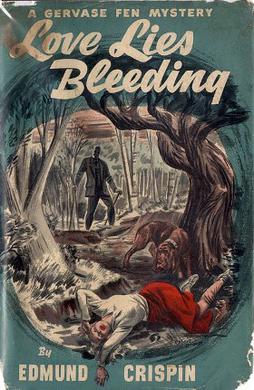
Love Lies Bleeding is a detective novel by Edmund Crispin, first published in 1948. Set in the post-war period in and around a public school in the vicinity of Stratford-upon-Avon, it is about the accidental discovery of old manuscripts which contain Shakespeare's long-lost play, Love's Labour's Won, and the subsequent hunt for those manuscripts, in the course of which several people are murdered. Collaborating with the local police, Oxford don Gervase Fen, a professor of English who happens to be the guest of honour at the school's Speech Day, can solve the case at the same weekend.
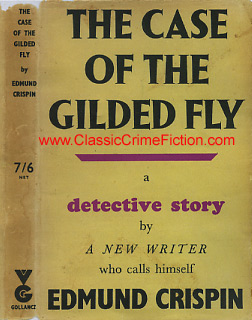
The Case of the Gilded Fly is a locked-room mystery by the English author Edmund Crispin, written while Crispin was an undergraduate at Oxford and first published in the UK in 1944. It was published in the US a year later under the title Obsequies at Oxford.
Gervase Fen is a fictional amateur detective and Oxford Professor of English Language and Literature created by Edmund Crispin. Fen appears in nine novels and two books of short stories published between 1944 and 1979. Fen is an unconventional detective who is often faced with a locked room mystery to solve.

Suddenly at His Residence is a 1946 crime novel by the British writer Christianna Brand. It is the third in a series featuring her detective Inspector Cockrill. In the United States it was published using the alternative title The Crooked Wreath.

Tour de Force is a 1955 mystery crime novel by the author Christianna Brand. It was the sixth novel in a series featuring the fictional police detective Inspector Cockrill. It was the last full-length novel in which Cockrill appears, although he features in some short stories. His sister Henrietta also features in the 1957 novel The Three Cornered Halo which uses the same setting as this work. Additionally, the minor character Mr Cecil from Death in High Heels (1941) appears in a more prominent role.

A Three-Pipe Problem is a 1975 mystery detective novel by the British writer Julian Symons. A pastiche of the original Sherlock Holmes stories by Arthur Conan Doyle, it takes place in the present day. The title refers to a line spoken in The Red-Headed League, referring to a particularly tricky problem that will take Holmes the time it takes to smoke three pipes to solve. It was followed by a sequel The Kentish Manor Murders.

The Widow's Cruise is a 1959 British detective novel by Cecil Day-Lewis, written under the pen name of Nicholas Blake. It is the thirteenth in a series of novels featuring the private detective Nigel Strangeways.

A Penknife in My Heart is a 1958 crime thriller novel by Cecil Day-Lewis, written under the pen name of Nicholas Blake. It was one of four stand-alone novels he wrote alongside the Nigel Strangeways detective novels.
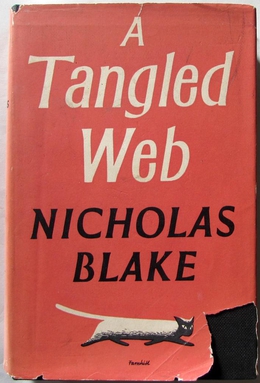
A Tangled Web is a 1956 British crime novel by Cecil Day-Lewis, written under the pen name of Nicholas Blake. It was one of four stand-alone novels he wrote under the name alongside the Nigel Strangeways detective novels. It was published by Harper in the United States under the alternative title Death and Daisy Bland.
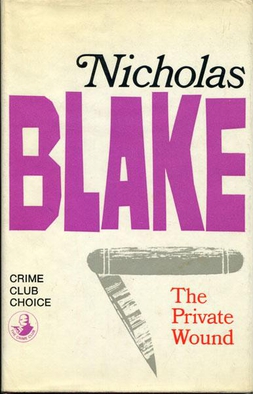
The Private Wound is a 1968 mystery thriller novel by Cecil Day-Lewis, written under the pen name of Nicholas Blake. It was one of four stand-alone novels he wrote alongside the Nigel Strangeways detective novels. The title is taken from a line in William Shakespeare's Two Gentlemen of Verona. It was a runner-up for the Gold Dagger Award of the British Crime Writers' Association.

Holy Disorders is a 1945 detective novel by the British writer Edmund Crispin. It the second in his series featuring the Oxford professor and amateur detective Gervase Fen. The novel is set in 1940 during the early stages of the Second World War. The title is a reference to Chaucer.

Swan Song is a 1947 detective novel by the British writer Edmund Crispin, the fourth in his series featuring the Oxford Don and amateur detective Gervase Fen. It was the first in a new three-book contract the author has signed with his publishers. It received a mixed review from critics.

Beware of the Trains is a collection of detective short stories by the British writer Edmund Crispin published in 1953. It contains sixteen stories including Beware of the Trains which gave its title to the collection. They all feature Crispin's amateur detective and Oxford professor Gervase Fen, an eccentric with a genius for solving complex cases. A number also featured Detective Inspector Humbleby of Scotland Yard who also appears in two of the novels in the Fen series. Apart from one they had all previously appeared in the Evening Standard newspaper. It was the last work featuring Fen for many years, until Crispin returned to the character for the 1977 novel The Glimpses of the Moon.
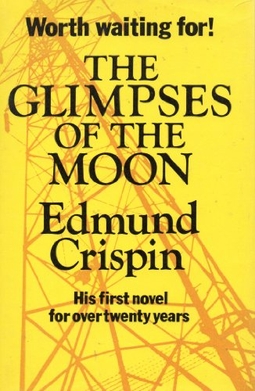
The Glimpses of the Moon is a 1977 detective novel by the British writer Edmund Crispin. It was the ninth and last novel in his series featuring Gervase Fen, an Oxford professor and amateur detective. Written from the 1960s onwards on publication it was the first novel in the series to be released since The Long Divorce in 1951. The author died the following year and in 1979 a final work Fen Country, a collection of short stories featuring the detective, was publish posthumously.
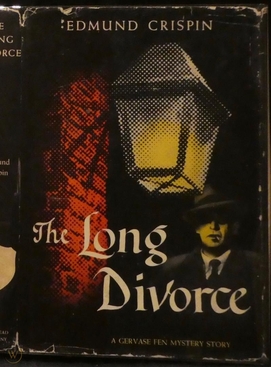
The Long Divorce is a 1951 detective novel by the British writer Edmund Crispin, the eighth in his series featuring the Oxford professor and amateur detective Gervase Fen. It was the penultimate novel in the series, with a gap or more than twenty five years before the next entry The Glimpses of the Moon, although a collection of short stories Beware of the Trains was published in 1953. The novel features many traits of a Golden Age mystery, set in a small, wealthy English village. The title doesn't refer to a marriage but is a quote from Shakespeare's Henry VIII "the long divorce of steel". It was published in the United States by Dodd, Mead in 1951 under the same title, and a year later as A Noose for Her.

The Viaduct Murder is a 1925 mystery detective novel by the British author Ronald Knox. A stand-alone novel, it was a precursor to his series of five books featured the insurance investigator Miles Bredon, all published during the Golden Age of Detective Fiction. It was published in London by Methuen and in New York by Simon and Schuster.

Frequent Hearses is a 1950 detective novel by the British author Edmund Crispin. It is the seventh in his series of novels featuring Gervase Fen an Oxford University professor and amateur detective. Published during the Golden Age of Detective Fiction, it is set in the British film industry where Fen has been employed as a historical advisor on The Unfortunate Lady, a biopic of the English poet Alexander Pope. The title is taken from a line of Pope's Elegy to the Memory of an Unfortunate Lady, "on all the line a sudden vengeance waits, and frequent hearses shall besiege your gates". It was published in the United States by Dodd, Mead the same year under the alternative title Sudden Vengeance.

















